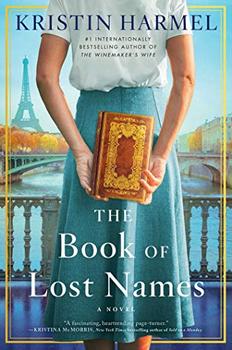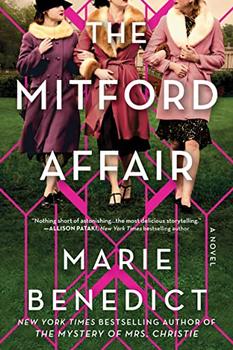Summary | Excerpt | Reading Guide | Discuss | Reviews | Beyond the book | Read-Alikes | Genres & Themes | Author Bio

There is certainly no shortage of books set in World War II Europe — from thrillers to family dramas — but even within this crowded setting, The Book of Lost Names stands out thanks to a strong sense of character and a compelling tale of love and survival.
While it doesn't carry the emotional or political weight of Hans Fallada's Alone in Berlin or Anthony Doerr's All the Light We Cannot See, Kristin Harmel's novel is tightly written and impressively affecting. The Book of Lost Names tells the story of Eva, a young Jewish Parisian and daughter of Polish migrants, that begins in 1942 and ends in 2005.
The novel flits back and forth between World War II Paris and 2005 Florida, with Eva now well into her eighties. When the titular Book of Lost Names — a book which Eva herself created during the war — turns up in Berlin, the events of this time in her life come rushing back to her.
In 1942, Eva is 23, living with her parents, and studying for her Ph.D. One night, she and her mother are babysitting the neighbor's children when Eva's father is pulled out of their apartment and stolen away by the Nazis. Eva and her mother escape to a quiet French town where Eva works to forge personal papers for those looking to flee into neutral Switzerland. It's here that Eva meets Remy, a fellow member of the resistance.
While The Book of Lost Names is set against the war-torn landscape of Nazi-occupied France and Eva is working as part of the resistance, this is, at its core, a love story — a book about how love can thrive even in the direst of circumstances.
It's also a book about identity. Eva creates new identities for those looking to escape and keeps their old ones safe, encoded within the Book of Lost Names. Her mother no longer knows who she is without her husband, and Eva herself is, in her mother's eyes, is betraying the Jewish faith by falling in with a Catholic boy.
These themes hold together expertly, and the love story that unfolds is a true tearjerker. Every character in the novel is well-rounded and clearly defined, if a little one-dimensional. The plot is a bit reminiscent of a Disney movie, however; the main characters are good people with small interpersonal dramas and there is a looming villainous presence. Nothing here is narratively complicated or heavy, even given the wartime setting and high political stakes.
There are also a frustrating number of contrivances, with things falling into place a little too effortlessly. More than once, a challenge will rise up, only for a character to suddenly appear, equipped with the exact skillset to meet and defeat it. One other small bugbear is the fact that the present-day chapters are written in the first person while the flashbacks are in the third person. Narratively, I felt it would have made more sense for it to be reversed, with present-day Eva telling her own story of the past in the first person, thus creating a greater sense of intimacy with both the present and past versions of her character.
Despite these gripes, The Book of Lost Names is a pure kind of novel. It works spectacularly as a love story; its characters are lovable and easy to bond with. The highs and lows all hit hard because of the tight pacing. It flows well from chapter to chapter and from act to act, with every emotional punch landing perfectly. It's not the most thematically or politically deep story — every motif has a spotlight on it and every character is written to be wholly transparent — but everything works in service of an emotionally satisfying story of familial and romantic love in a time of war.
![]() This review was originally published in The BookBrowse Review in December 2020, and has been updated for the
June 2021 edition.
Click here to go to this issue.
This review was originally published in The BookBrowse Review in December 2020, and has been updated for the
June 2021 edition.
Click here to go to this issue.

If you liked The Book of Lost Names, try these:

by Derek B. Miller
Published 2025
From the Dagger Award–winning author of Norwegian by Night comes a vivid, thrilling, and moving World War II art-heist-adventure tale where enemies become heroes, allies become villains, and a child learns what it means to become an adult—for fans of All the Light We Cannot See.

by Marie Benedict
Published 2023
From New York Times bestselling author Marie Benedict comes an explosive novel of history's most notorious sisters, one of whom will have to choose: her country or her family?
If there is anything more dangerous to the life of the mind than having no independent commitment to ideas...
Click Here to find out who said this, as well as discovering other famous literary quotes!
Your guide toexceptional books
BookBrowse seeks out and recommends the best in contemporary fiction and nonfiction—books that not only engage and entertain but also deepen our understanding of ourselves and the world around us.